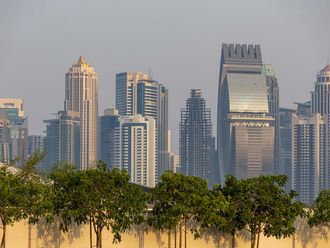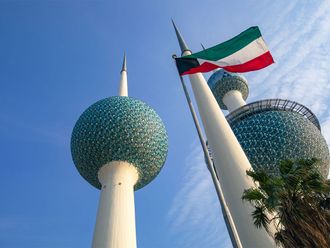The iron hand of the Chinese state never strays too far. Earlier this year, Premier Wen Jiabao warned he would use an "iron fist" to bring carbon emissions under control, but nobody is complaining, least of those dealing in solar stocks.
China's accelerated journey to the next stage of the industrial revolution — powered by alternative energy — has domestic and global solar component companies hovering around for their place in the sun. All eyes are now on Beijing publicising its Alternative Energy Plan (2011 to 2020), a blueprint that involves 5 trillion yuan (Dh2.69 trillion) of investment in new energy sectors. Much like the 4 trillion yuan stimulus package of 2008 which carried China through the global financial crisis, the new energy plan is expected to generate an assured market for solar, wind, nuclear and biomass energy companies globally.
Energy-shift plan
Currently, the installed capacity of China's power sector is around 700 million kw, and 70 per cent of that comes from coal. By 2020, China wants to reduce its dependence on coal to around 55 per cent.
As part of this tectonic energy-shift plan, Beijing wants to increase installed capacity of solar-driven power by more than 60-fold to 20,000 megawatts by 2020. China's emphasis on solar energy remains unmatched, offering as it does, huge opportunities for domestic and global companies.
For starters, 50 companies, including those from Canada and US, are in the running for 13 new large-scale solar power projects capable of creating 280 mw of renewable energy capacity. Along with beefing up the renewable sector, policy makers want to ensure that much of this happens in the under-developed western region. The mega solar projects include facilities in Xinjiang, Gansu and Inner Mongolia. The bulk of the bids, however, come from state-owned project developers.
Market-tested
Chinese solar stocks, most of which are listed in New York, are not likely to see the sunset any time soon, backed as they are by Beijing's sumo-style policy muscle.
The solar equipment sector is one nascent industry which has been thrown to the test of the international markets and has driven off safe. Most Chinese solar companies are listed in New York and managed to ride out the chaos during the second quarter. The solar market faced peculiar contradictions. At one end, global demand for solar products was exploding and companies were over booked and sold out. However, since most of the demand came from Europe, it left many firms vulnerable to a weak euro during the Greek crisis.
Chinese companies, however, managed to ride through the tide and most of them have raised their full-year forecast and posted strong Q2 profits. Shanghai-based JA Solar Holdings and LDK Solar both raised their forecast for full-year sales based on strong demand. Even as the solar sector got hammered last week in New York, Chinese players soared ahead. On the whole, the Chinese Solar Stocks Index was ahead by 2 per cent in New York last week as JA Solar, Solarfun Power Holdings and LDK Solar Company soared.
Chinese solar units also remain beneficiaries of an ultra-nationalist agenda, which does not always allow a level playing field for foreign competitors. The government is known for creating "buy Chinese" diktats for big projects within its borders.
With spectacular thoroughness, China has promoted its alternative energy strategy simply by building cities dedicated to each sector. Dezhou in Shandong, East China, was the first to grasp the potential of solar energy. This small city with its ‘Solar Valley' has the largest solar energy R&D facility in the world and houses more than 110 companies, including China Himin Solar Energy Group, which is the largest producer of solar water heaters in the world. The company plans to bring out its IPO this year.
The Solar Valley administration, apart from building a complete industrial chain of solar products and offering preferential policies and tax incentives to companies, goes a step further. It offers expert advice on how to get listed on stock exchanges!
The writer is a freelance journalist based in China










